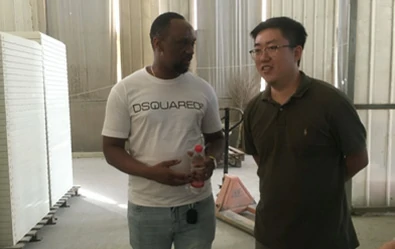loading...
- No. 9, Xingyuan South Street, Dongwaihuan Road, Zaoqiang County, Hengshui, Hebei, China
- admin@zjcomposites.com
- +86 15097380338
- Welcome to visit our website!
FRP Composite Pressure Vessels for Enhanced Performance and Safety Applications
Understanding FRP Pressure Vessels A Comprehensive Overview
Fiber Reinforced Polymer (FRP) pressure vessels have emerged as a groundbreaking advancement in the field of material science and engineering. These vessels, made primarily from polymer matrices reinforced with fibers, offer a host of advantages over traditional materials such as steel and aluminum. As industries continue to seek innovative solutions for efficiency and sustainability, FRP pressure vessels stand out for their unique properties and applications.
Composition and Manufacturing of FRP Pressure Vessels
FRP pressure vessels are composed of a polymer matrix, usually epoxy or vinyl ester, reinforced with fibers like glass, carbon, or aramid. This composite structure provides the vessels with exceptional strength-to-weight ratios and resistance to corrosion and environmental degradation. The manufacturing process typically involves techniques like filament winding, pultrusion, and resin transfer molding (RTM). Filament winding, for instance, allows for precise control over the orientation of the fibers, which can be customized to maximize strength in areas where pressure is greatest.
The ability to tailor the design and material properties makes FRP vessels highly versatile, suitable for a wide range of applications from water storage to industrial chemical processing. Additionally, FRP vessels can be designed to meet specific regulations and standards, including those set forth by the American Society of Mechanical Engineers (ASME) for pressure vessels, ensuring safety and reliability in their use.
Advantages of FRP Pressure Vessels
One of the most significant benefits of FRP pressure vessels is their lightweight nature. Compared to metallic alternatives, FRP vessels are considerably lighter, which reduces transportation costs and simplifies installation processes. This lightweight characteristic also offers advantages in seismic or dynamic load conditions, making them suitable for various geographical locations.
frp pressure vessel

Another crucial advantage is their inherent corrosion resistance. FRP materials do not rust and can withstand harsh chemicals, making them ideal for applications in chemical manufacturing, wastewater treatment, and oil and gas industries. This property extends the lifespan of the vessels and reduces maintenance costs, offering a compelling reason for industries to invest in FRP technology.
Additionally, FRP pressure vessels are capable of operating at higher temperatures and pressures than many traditional materials. They can provide safe containment for gases and liquids that would be corrosive or damaging to metallic vessels. Their ability to be engineered for specific pressure and temperature ratings makes them suitable for customized applications.
Applications in Various Industries
The applications of FRP pressure vessels are diverse and span multiple sectors. In the chemical industry, they are used for storing and transporting aggressive chemicals and acids. In the oil and gas sector, these vessels serve as separators, scrubbers, and tanks for various fluids. Water treatment facilities also benefit from FRP technology, utilizing these vessels for storage and processing to enhance operational efficiency.
The renewable energy sector is increasingly adopting FRP pressure vessels. For instance, in the wind energy industry, these materials are used in the construction of components that require high strength at lower weights. Similarly, their application in hydrogen storage systems is gaining traction as the world pivots towards cleaner energy solutions.
Conclusion
In conclusion, FRP pressure vessels represent a significant leap forward in the engineering of pressure containment solutions. Their unique blend of lightweight, strength, corrosion resistance, and adaptability to various applications positions them as a preferred choice across multiple industries. As technology continues to evolve, the importance of FRP pressure vessels will likely grow, paving the way for enhanced performance, sustainability, and efficiency in industrial applications. Embracing this innovative material could profoundly impact how industries approach pressure containment, ultimately leading to safer and more cost-effective solutions.
-
The Rise of FRP Profiles: Strong, Lightweight, and Built to LastNewsJul.14,2025
-
SMC Panel Tanks: A Modern Water Storage Solution for All EnvironmentsNewsJul.14,2025
-
GRP Grating: A Modern Solution for Safe and Durable Access SystemsNewsJul.14,2025
-
Galvanized Steel Water Tanks: Durable, Reliable, and Ready for UseNewsJul.14,2025
-
FRP Mini Mesh Grating: The Safer, Smarter Flooring SolutionNewsJul.14,2025
-
Exploring FRP Vessels: Durable Solutions for Modern Fluid HandlingNewsJul.14,2025
-
GRP Structures: The Future of Lightweight, High-Performance EngineeringNewsJun.20,2025
